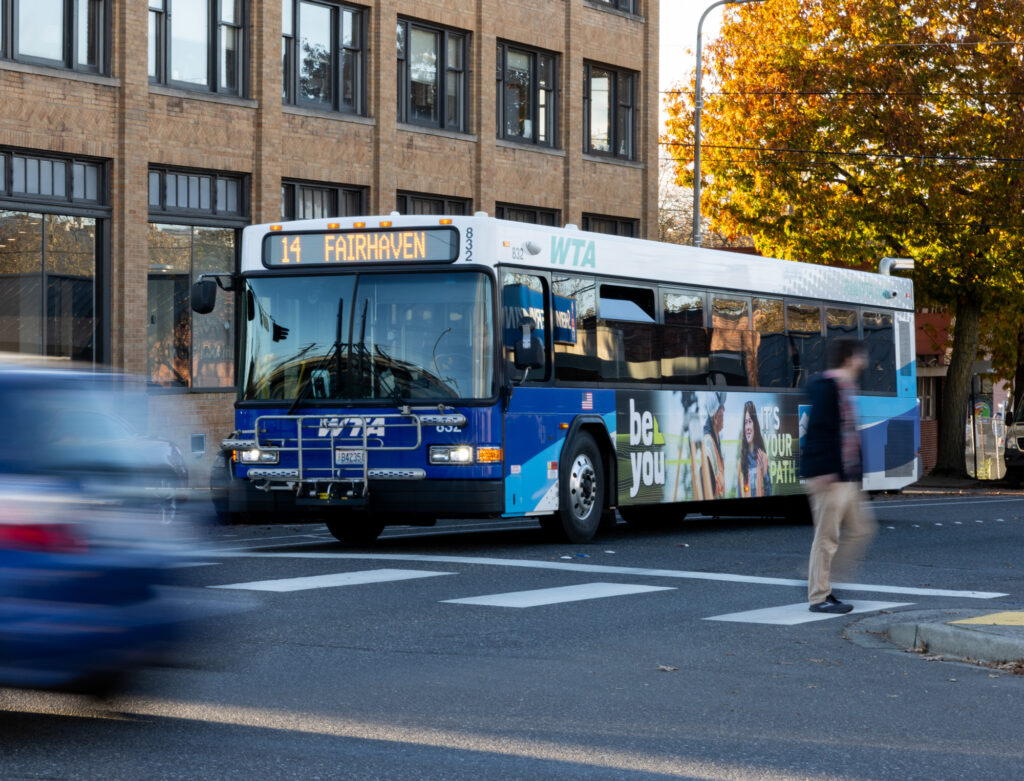LETTER OF THE WEEK

Editor,
Thank you for the recent well-reported Cascadia Daily News article which centers the experiences of Whatcom Transit Authority bus riders (CDN, Jan. 16, 2025). It’s rare but refreshing when local news outlets pay careful attention to the specific needs of transit users.
By simply riding the bus around town with some amount of regularity, local stakeholders, including elected officials and journalists, can unlock a level of greater understanding of their community and their neighbors, something they wouldn’t get from a windshield-only perspective driving around town.
In Bellingham, where a significant amount of civic oxygen is spent on debates over bike lanes and parking, thoughtful and informed discussions about our local transit network generally fall by the wayside. While we don’t have a perfect network, WTA’s upcoming June service changes are, by and large, a promising step toward a better system (CDN, Dec. 5, 2024).
You can’t effectively improve local transit from the sidelines. You have to get onboard first. And even if you drive everywhere, it’s important to recognize that a strong transit network is critically important for local economic vitality.
WTA buses connect people to various opportunities, whether it’s someone commuting to their job or a retiree using the bus en route to play pickleball. Remember, Bellinghamsters: As the costs of driving continue to increase — including car payments, insurance, parking, repairs and fuel — a $30 WTA monthly bus pass is roughly the cost of two sandwiches at Avenue Bread.
Michael Grass
Bellingham
Editor’s note: Congratulations to Michael for being singled out for CDN’s first “Letter of the Week,” a new feature and extremely high honor that comes with … the satisfaction of having written a Letter of the Week! Consider it seven-day Bell-ebrity status. Here’s to many more.
Editor,
Astronauts typically express awe and even love for the beautiful Earth below while they’re in orbit. One wonders how they feel when seeing such raging, massive blazes as the firestorm viciously consuming a large swath of Los Angeles, or the huge fires frequently ravaging the Amazonian rainforest?
As Brazil’s (previous) president, Jair Bolsonaro had recklessly allowed the rainforest to be razed by both meat farmers and wildfires. Incredibly, in the midst of yet another unprecedented wildfire during the summer of 2019, the evangelical Christian president declared that his presidency — and, I presume, all of the formidable environmental damage he inflicts while in power — is somehow divine: “It is difficult to be president of Brazil because it is a president that has less authority. I am fulfilling a mission from God.”
(Strangely enough though not surprising, early on Nov. 6, Donald Trump stated: “Many people have told me that God spared my life for a reason. And that reason was to save our country and to restore America to greatness.”)
As Canada’s (previous) prime minister, Stephen Harper, who also is an evangelical Christian, was unrelenting in his pro-fossil-fuel/anti-natural-environment war against science. (As PM, Harper also felt compelled to take a group of 208 people with him to the Holy City, Jerusalem, in 2014.)
There also is a belief held by much of conservative “Christianity” that to defend the natural environment from the planet’s greatest polluters, notably the fossil fuel industry, is to go against God’s will and is therefore inherently evil. Many even credit the bone-dry-vegetation areas uncontrollably burning in California seemingly every year to some divine wrath upon that state’s collective liberal sinfulness.
Frank Sterle Jr.
White Rock, British Columbia
Editor,
Samish Crest trails have been used for many years. Thirty years ago, Bellingham began purchasing this land for trails. Fifteen years ago, Bellingham improved 2,200 feet of trail from Racine Street and published a map showing connecting trails coming from nearby neighborhoods as park trails. Unfortunately, some people must avoid these trails due to off-leash dogs.
I encounter loose dogs on these on-leash trails most days. Many arrive via connecting trails. Some dogs are aggressive and with no owner in sight. Some arriving owners insist they’re entitled to let their dogs run loose.
Three years ago, Bellingham said it would focus on education rather than enforcement to address dog issues in parks. Parks Director Nicole Oliver said she planned to post more signs reminding people to leash their dogs.
Last September, I asked Parks to install signs on the connecting trails to educate owners to leash their dogs. Director Oliver replied: “While it may seem easy to add dog waste stations and signage, we need a plan for this area first, and be able to ensure we can maintain the new dog waste stations and trails before formally adding the area to our existing network,” and “there is $200K in the budget for 2026 for this work.”
I asked for signs, not dog waste stations. Why wait until 2026 or later to address ongoing problems with off-leash dogs? [Paying] $150 for a sign on a connecting trail is the least Bellingham should do to educate dog owners to leash their dogs.
Greg McKinney
Bellingham
Editor,
“Bad Faith,” the 2024 documentary film about the “American Taliban,” Christian Nationalists, is a coherent analysis of the marriage of the Wise Use movement funded by oil companies like Shell and BP to attack environmental protection laws and the Christian White Supremacy movement aimed at ending equal protection under the law for others.
As noted in the film, this holy war has been underway for generations. The fact so many are unaware of this history is a condemnation of private equity media, as well as liberal laziness and cowardice in holding local media accountable for not reporting on criminal misconduct by their advertisers, and for bigotry promoted on radio stations like KGMI.
The “American Taliban” are committed to replacing democracy with theocracy and are willing to use extreme violence to do it, such as they did in 1995 when they blew up the Oklahoma City federal building, claiming 168 lives. In this century, presidents Bush and Trump ended the domestic terrorism programs at the Department of Justice to protect them.
Jay Taber
Blaine
Editor,
No one can have an issue with arresting criminals who are dangerous or commit crimes against people. Crimes against property are another matter, but we leave that up to prosecutors to do their job. If there are known dangerous criminals on the streets, that is the fault of law enforcement, as well as prosecutors not doing their jobs effectively.
Law enforcers need the involvement of legislators and the community in establishing standards. All must be scrutinized to make sure racism does not play a part.
The Trump administration seems to think mass roundups of people of color under the guise of their immigration status is a cure-all. It is just a stunt.
Trump even wants to extend this to family members born here or without criminal complaints against them. I hope our county does not waste time and money on such crusades. If a person is known to be dangerous, then they should already be in the system?
All of our families, save the people whose lands were stolen from them, came to this country from elsewhere and that is what has made us a great country. We don’t need a grandstanding felon telling us who is worthy and who is not.
Michael Waite
Sedro-Woolley
Editor,
The article “Should public transit prioritize more riders or broader access? WTA to decide” (CDN, Jan. 16, 2025) raises more questions than it answered. Why did WTA narrow its choices to just two?
If the answer is more riders, shouldn’t the City of Bellingham be the governing body making decisions about how best to serve those riders? Those people happen to be the constituents of our city elected officials, but not all are on the WTA Board. About 95% of current riders originate from within Bellingham. If more riders is the priority, those additional riders will be derived from a reallocation of resources to the most productive WTA services within Bellingham. Everett Transit is an example of an operation that has prioritized ridership. Suggesting such a consequence is not without a regional precedent.
If the answer is broader access, shouldn’t Whatcom County be the governing body making decisions about how best to offer broader access? Broader access is mostly for transit-dependent people throughout the county, often going to and from county social services. King County Metro is an example of an operation that has prioritized broader access. So, again, suggesting such a consequence is not without a regional precedent.
Shouldn’t there be other priorities? Does not one priority involve providing a balanced, multi-modal public transportation system? If the answer is yes, shouldn’t the WTA continue to be the governing body?
It is unclear why WTA wants to question why it exists. If WTA picks one of the two priorities it has proposed, one must wonder whether WTA is the correct governing body to fulfill the future path it has selected.
Wes Frysztacki
Bellingham
Letters to the Editor are published online Wednesdays; a selection is published in print Fridays. Send to letters@cascadiadaily.com by 10 a.m. Tuesdays. Rules: Maximum 250 words, be civil, have a point and make it clearly. Preference is given to letters about local subjects. CDN reserves the right to reject letters or edit for length, clarity, grammar and style, or removal of personal attacks or offensive content. Letters must include an address/phone number to verify the writer's identity (not for publication).



Guest writer: Let’s fix, not abandon, our broken political system